Business Law: Parliament Sovereignty, Business Forms, and Cases
VerifiedAdded on 2020/12/08
|14
|4953
|208
Report
AI Summary
This business law report provides a comprehensive overview of the UK legal system, focusing on parliamentary sovereignty, sources of law, and the roles of government in law-making. It explores the application of statutory and common law within the justice system, and examines the impact of employment and contract law on businesses. The report further delves into different forms of business organizations, their management, funding, and the consequences of non-compliance with relevant laws. Section 2 provides legal advice for two case studies, offering alternative dispute resolution (ADR) solutions. The report covers a range of topics including, employment law, contract law, and the different types of business organizations.

Business law
Paraphrase This Document
Need a fresh take? Get an instant paraphrase of this document with our AI Paraphraser
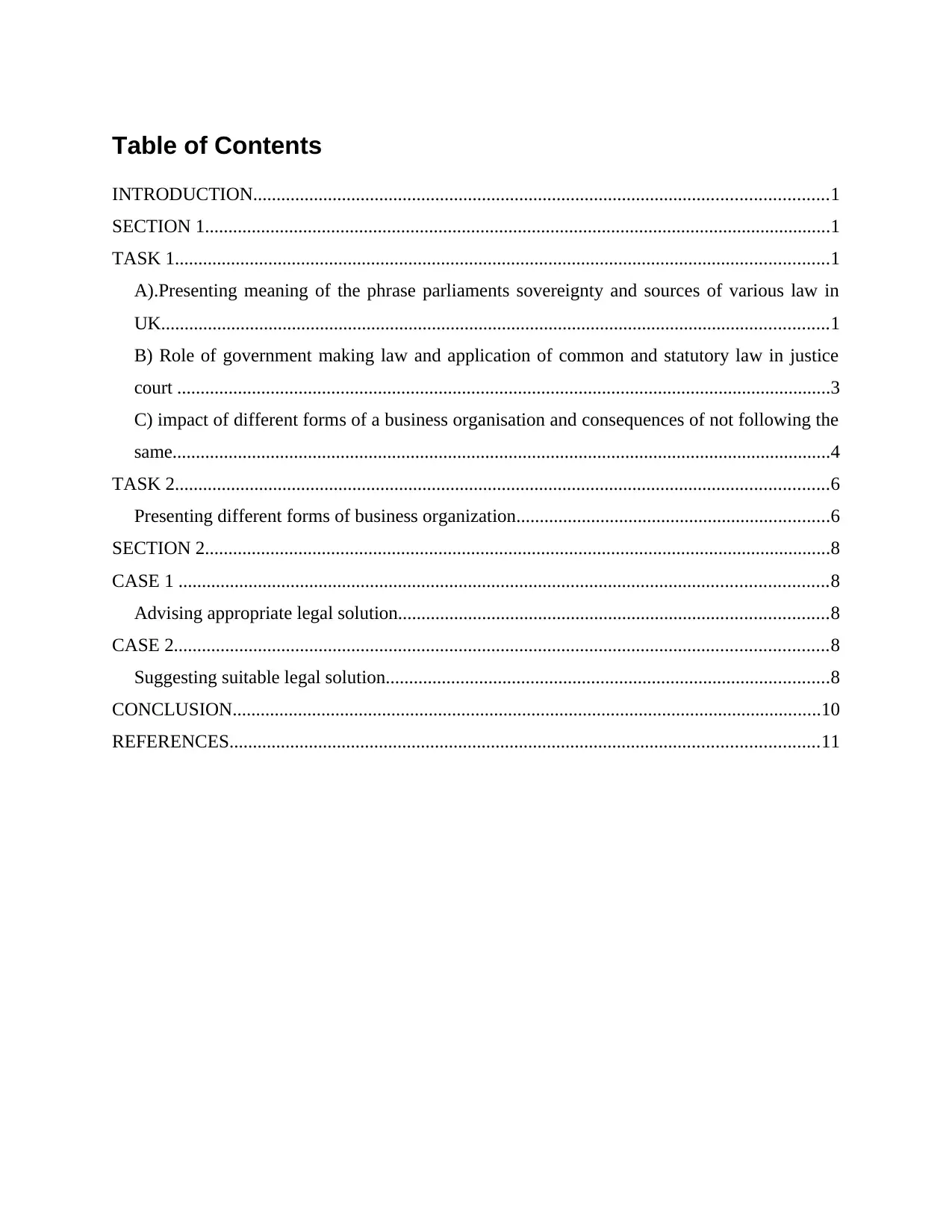
Table of Contents
INTRODUCTION...........................................................................................................................1
SECTION 1......................................................................................................................................1
TASK 1............................................................................................................................................1
A).Presenting meaning of the phrase parliaments sovereignty and sources of various law in
UK...............................................................................................................................................1
B) Role of government making law and application of common and statutory law in justice
court ............................................................................................................................................3
C) impact of different forms of a business organisation and consequences of not following the
same.............................................................................................................................................4
TASK 2............................................................................................................................................6
Presenting different forms of business organization...................................................................6
SECTION 2......................................................................................................................................8
CASE 1 ...........................................................................................................................................8
Advising appropriate legal solution............................................................................................8
CASE 2............................................................................................................................................8
Suggesting suitable legal solution...............................................................................................8
CONCLUSION..............................................................................................................................10
REFERENCES..............................................................................................................................11
INTRODUCTION...........................................................................................................................1
SECTION 1......................................................................................................................................1
TASK 1............................................................................................................................................1
A).Presenting meaning of the phrase parliaments sovereignty and sources of various law in
UK...............................................................................................................................................1
B) Role of government making law and application of common and statutory law in justice
court ............................................................................................................................................3
C) impact of different forms of a business organisation and consequences of not following the
same.............................................................................................................................................4
TASK 2............................................................................................................................................6
Presenting different forms of business organization...................................................................6
SECTION 2......................................................................................................................................8
CASE 1 ...........................................................................................................................................8
Advising appropriate legal solution............................................................................................8
CASE 2............................................................................................................................................8
Suggesting suitable legal solution...............................................................................................8
CONCLUSION..............................................................................................................................10
REFERENCES..............................................................................................................................11
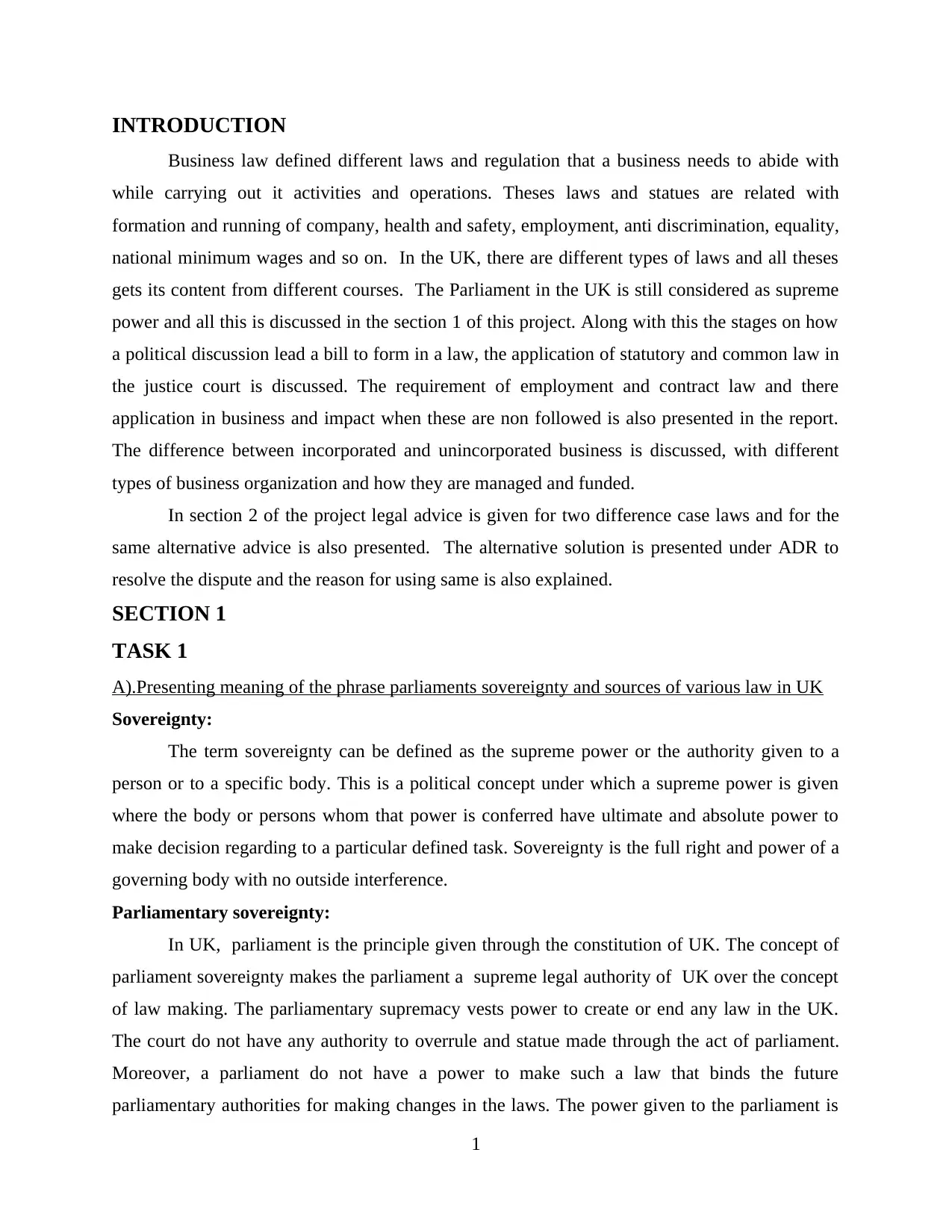
INTRODUCTION
Business law defined different laws and regulation that a business needs to abide with
while carrying out it activities and operations. Theses laws and statues are related with
formation and running of company, health and safety, employment, anti discrimination, equality,
national minimum wages and so on. In the UK, there are different types of laws and all theses
gets its content from different courses. The Parliament in the UK is still considered as supreme
power and all this is discussed in the section 1 of this project. Along with this the stages on how
a political discussion lead a bill to form in a law, the application of statutory and common law in
the justice court is discussed. The requirement of employment and contract law and there
application in business and impact when these are non followed is also presented in the report.
The difference between incorporated and unincorporated business is discussed, with different
types of business organization and how they are managed and funded.
In section 2 of the project legal advice is given for two difference case laws and for the
same alternative advice is also presented. The alternative solution is presented under ADR to
resolve the dispute and the reason for using same is also explained.
SECTION 1
TASK 1
A).Presenting meaning of the phrase parliaments sovereignty and sources of various law in UK
Sovereignty:
The term sovereignty can be defined as the supreme power or the authority given to a
person or to a specific body. This is a political concept under which a supreme power is given
where the body or persons whom that power is conferred have ultimate and absolute power to
make decision regarding to a particular defined task. Sovereignty is the full right and power of a
governing body with no outside interference.
Parliamentary sovereignty:
In UK, parliament is the principle given through the constitution of UK. The concept of
parliament sovereignty makes the parliament a supreme legal authority of UK over the concept
of law making. The parliamentary supremacy vests power to create or end any law in the UK.
The court do not have any authority to overrule and statue made through the act of parliament.
Moreover, a parliament do not have a power to make such a law that binds the future
parliamentary authorities for making changes in the laws. The power given to the parliament is
1
Business law defined different laws and regulation that a business needs to abide with
while carrying out it activities and operations. Theses laws and statues are related with
formation and running of company, health and safety, employment, anti discrimination, equality,
national minimum wages and so on. In the UK, there are different types of laws and all theses
gets its content from different courses. The Parliament in the UK is still considered as supreme
power and all this is discussed in the section 1 of this project. Along with this the stages on how
a political discussion lead a bill to form in a law, the application of statutory and common law in
the justice court is discussed. The requirement of employment and contract law and there
application in business and impact when these are non followed is also presented in the report.
The difference between incorporated and unincorporated business is discussed, with different
types of business organization and how they are managed and funded.
In section 2 of the project legal advice is given for two difference case laws and for the
same alternative advice is also presented. The alternative solution is presented under ADR to
resolve the dispute and the reason for using same is also explained.
SECTION 1
TASK 1
A).Presenting meaning of the phrase parliaments sovereignty and sources of various law in UK
Sovereignty:
The term sovereignty can be defined as the supreme power or the authority given to a
person or to a specific body. This is a political concept under which a supreme power is given
where the body or persons whom that power is conferred have ultimate and absolute power to
make decision regarding to a particular defined task. Sovereignty is the full right and power of a
governing body with no outside interference.
Parliamentary sovereignty:
In UK, parliament is the principle given through the constitution of UK. The concept of
parliament sovereignty makes the parliament a supreme legal authority of UK over the concept
of law making. The parliamentary supremacy vests power to create or end any law in the UK.
The court do not have any authority to overrule and statue made through the act of parliament.
Moreover, a parliament do not have a power to make such a law that binds the future
parliamentary authorities for making changes in the laws. The power given to the parliament is
1
⊘ This is a preview!⊘
Do you want full access?
Subscribe today to unlock all pages.

Trusted by 1+ million students worldwide
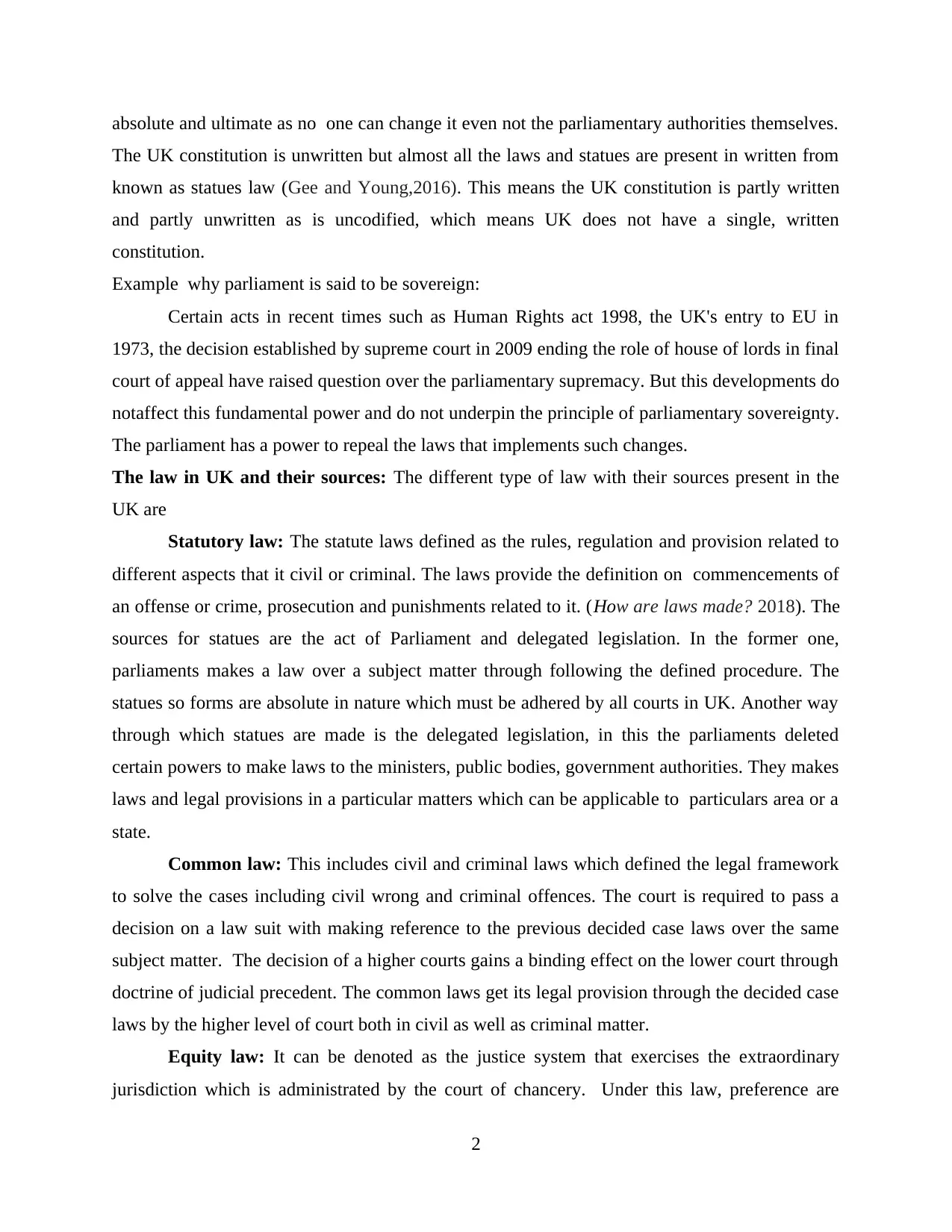
absolute and ultimate as no one can change it even not the parliamentary authorities themselves.
The UK constitution is unwritten but almost all the laws and statues are present in written from
known as statues law (Gee and Young,2016). This means the UK constitution is partly written
and partly unwritten as is uncodified, which means UK does not have a single, written
constitution.
Example why parliament is said to be sovereign:
Certain acts in recent times such as Human Rights act 1998, the UK's entry to EU in
1973, the decision established by supreme court in 2009 ending the role of house of lords in final
court of appeal have raised question over the parliamentary supremacy. But this developments do
notaffect this fundamental power and do not underpin the principle of parliamentary sovereignty.
The parliament has a power to repeal the laws that implements such changes.
The law in UK and their sources: The different type of law with their sources present in the
UK are
Statutory law: The statute laws defined as the rules, regulation and provision related to
different aspects that it civil or criminal. The laws provide the definition on commencements of
an offense or crime, prosecution and punishments related to it. (How are laws made? 2018). The
sources for statues are the act of Parliament and delegated legislation. In the former one,
parliaments makes a law over a subject matter through following the defined procedure. The
statues so forms are absolute in nature which must be adhered by all courts in UK. Another way
through which statues are made is the delegated legislation, in this the parliaments deleted
certain powers to make laws to the ministers, public bodies, government authorities. They makes
laws and legal provisions in a particular matters which can be applicable to particulars area or a
state.
Common law: This includes civil and criminal laws which defined the legal framework
to solve the cases including civil wrong and criminal offences. The court is required to pass a
decision on a law suit with making reference to the previous decided case laws over the same
subject matter. The decision of a higher courts gains a binding effect on the lower court through
doctrine of judicial precedent. The common laws get its legal provision through the decided case
laws by the higher level of court both in civil as well as criminal matter.
Equity law: It can be denoted as the justice system that exercises the extraordinary
jurisdiction which is administrated by the court of chancery. Under this law, preference are
2
The UK constitution is unwritten but almost all the laws and statues are present in written from
known as statues law (Gee and Young,2016). This means the UK constitution is partly written
and partly unwritten as is uncodified, which means UK does not have a single, written
constitution.
Example why parliament is said to be sovereign:
Certain acts in recent times such as Human Rights act 1998, the UK's entry to EU in
1973, the decision established by supreme court in 2009 ending the role of house of lords in final
court of appeal have raised question over the parliamentary supremacy. But this developments do
notaffect this fundamental power and do not underpin the principle of parliamentary sovereignty.
The parliament has a power to repeal the laws that implements such changes.
The law in UK and their sources: The different type of law with their sources present in the
UK are
Statutory law: The statute laws defined as the rules, regulation and provision related to
different aspects that it civil or criminal. The laws provide the definition on commencements of
an offense or crime, prosecution and punishments related to it. (How are laws made? 2018). The
sources for statues are the act of Parliament and delegated legislation. In the former one,
parliaments makes a law over a subject matter through following the defined procedure. The
statues so forms are absolute in nature which must be adhered by all courts in UK. Another way
through which statues are made is the delegated legislation, in this the parliaments deleted
certain powers to make laws to the ministers, public bodies, government authorities. They makes
laws and legal provisions in a particular matters which can be applicable to particulars area or a
state.
Common law: This includes civil and criminal laws which defined the legal framework
to solve the cases including civil wrong and criminal offences. The court is required to pass a
decision on a law suit with making reference to the previous decided case laws over the same
subject matter. The decision of a higher courts gains a binding effect on the lower court through
doctrine of judicial precedent. The common laws get its legal provision through the decided case
laws by the higher level of court both in civil as well as criminal matter.
Equity law: It can be denoted as the justice system that exercises the extraordinary
jurisdiction which is administrated by the court of chancery. Under this law, preference are
2
Paraphrase This Document
Need a fresh take? Get an instant paraphrase of this document with our AI Paraphraser
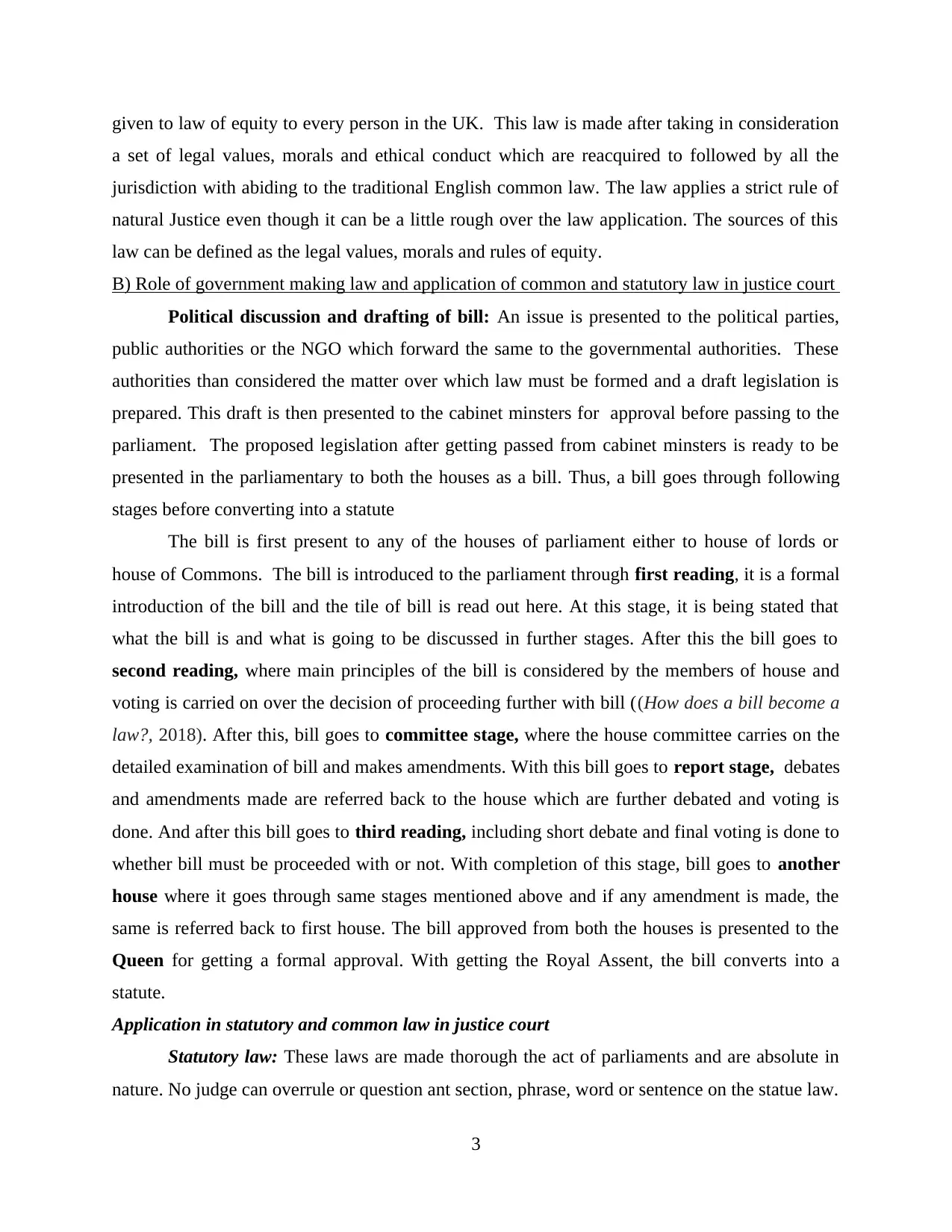
given to law of equity to every person in the UK. This law is made after taking in consideration
a set of legal values, morals and ethical conduct which are reacquired to followed by all the
jurisdiction with abiding to the traditional English common law. The law applies a strict rule of
natural Justice even though it can be a little rough over the law application. The sources of this
law can be defined as the legal values, morals and rules of equity.
B) Role of government making law and application of common and statutory law in justice court
Political discussion and drafting of bill: An issue is presented to the political parties,
public authorities or the NGO which forward the same to the governmental authorities. These
authorities than considered the matter over which law must be formed and a draft legislation is
prepared. This draft is then presented to the cabinet minsters for approval before passing to the
parliament. The proposed legislation after getting passed from cabinet minsters is ready to be
presented in the parliamentary to both the houses as a bill. Thus, a bill goes through following
stages before converting into a statute
The bill is first present to any of the houses of parliament either to house of lords or
house of Commons. The bill is introduced to the parliament through first reading, it is a formal
introduction of the bill and the tile of bill is read out here. At this stage, it is being stated that
what the bill is and what is going to be discussed in further stages. After this the bill goes to
second reading, where main principles of the bill is considered by the members of house and
voting is carried on over the decision of proceeding further with bill ((How does a bill become a
law?, 2018). After this, bill goes to committee stage, where the house committee carries on the
detailed examination of bill and makes amendments. With this bill goes to report stage, debates
and amendments made are referred back to the house which are further debated and voting is
done. And after this bill goes to third reading, including short debate and final voting is done to
whether bill must be proceeded with or not. With completion of this stage, bill goes to another
house where it goes through same stages mentioned above and if any amendment is made, the
same is referred back to first house. The bill approved from both the houses is presented to the
Queen for getting a formal approval. With getting the Royal Assent, the bill converts into a
statute.
Application in statutory and common law in justice court
Statutory law: These laws are made thorough the act of parliaments and are absolute in
nature. No judge can overrule or question ant section, phrase, word or sentence on the statue law.
3
a set of legal values, morals and ethical conduct which are reacquired to followed by all the
jurisdiction with abiding to the traditional English common law. The law applies a strict rule of
natural Justice even though it can be a little rough over the law application. The sources of this
law can be defined as the legal values, morals and rules of equity.
B) Role of government making law and application of common and statutory law in justice court
Political discussion and drafting of bill: An issue is presented to the political parties,
public authorities or the NGO which forward the same to the governmental authorities. These
authorities than considered the matter over which law must be formed and a draft legislation is
prepared. This draft is then presented to the cabinet minsters for approval before passing to the
parliament. The proposed legislation after getting passed from cabinet minsters is ready to be
presented in the parliamentary to both the houses as a bill. Thus, a bill goes through following
stages before converting into a statute
The bill is first present to any of the houses of parliament either to house of lords or
house of Commons. The bill is introduced to the parliament through first reading, it is a formal
introduction of the bill and the tile of bill is read out here. At this stage, it is being stated that
what the bill is and what is going to be discussed in further stages. After this the bill goes to
second reading, where main principles of the bill is considered by the members of house and
voting is carried on over the decision of proceeding further with bill ((How does a bill become a
law?, 2018). After this, bill goes to committee stage, where the house committee carries on the
detailed examination of bill and makes amendments. With this bill goes to report stage, debates
and amendments made are referred back to the house which are further debated and voting is
done. And after this bill goes to third reading, including short debate and final voting is done to
whether bill must be proceeded with or not. With completion of this stage, bill goes to another
house where it goes through same stages mentioned above and if any amendment is made, the
same is referred back to first house. The bill approved from both the houses is presented to the
Queen for getting a formal approval. With getting the Royal Assent, the bill converts into a
statute.
Application in statutory and common law in justice court
Statutory law: These laws are made thorough the act of parliaments and are absolute in
nature. No judge can overrule or question ant section, phrase, word or sentence on the statue law.
3
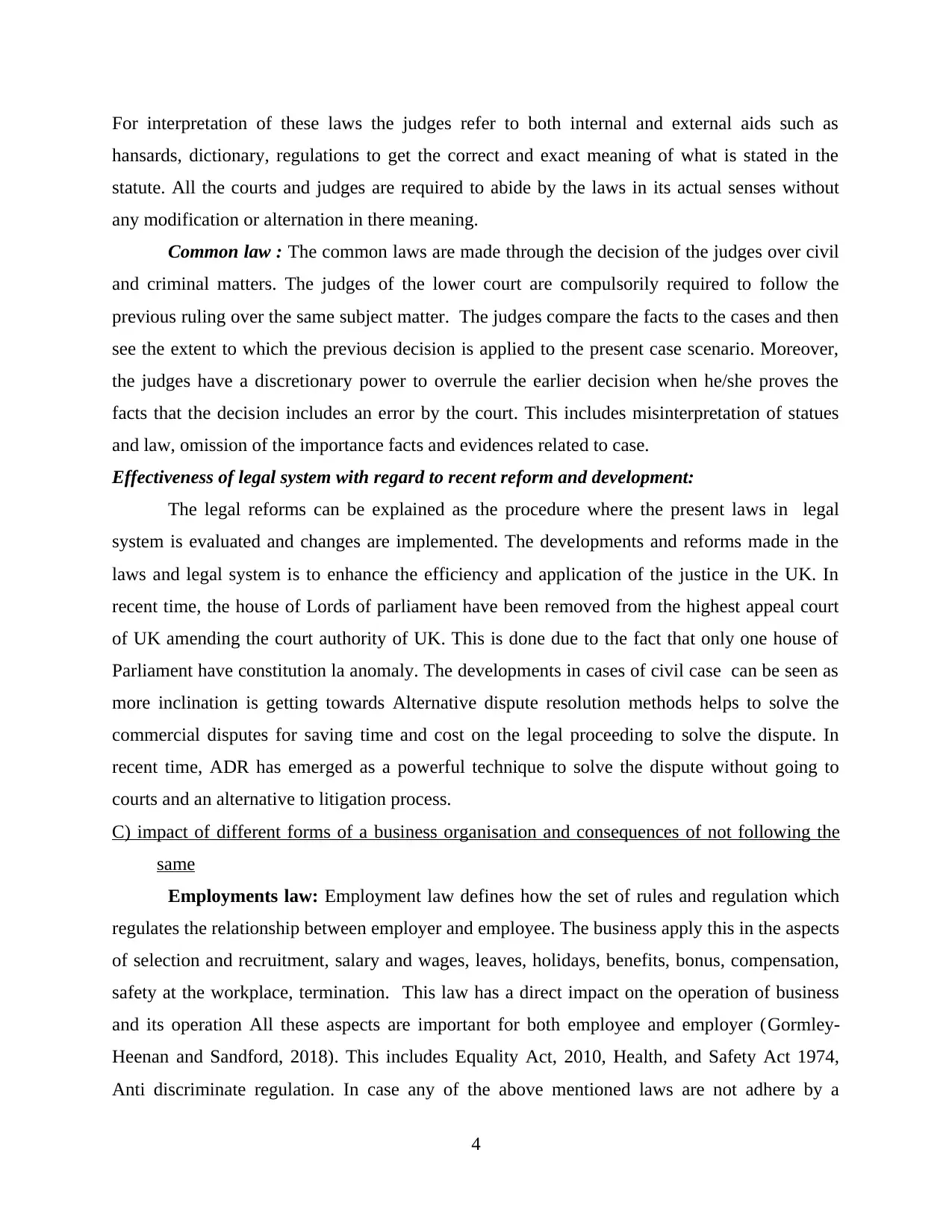
For interpretation of these laws the judges refer to both internal and external aids such as
hansards, dictionary, regulations to get the correct and exact meaning of what is stated in the
statute. All the courts and judges are required to abide by the laws in its actual senses without
any modification or alternation in there meaning.
Common law : The common laws are made through the decision of the judges over civil
and criminal matters. The judges of the lower court are compulsorily required to follow the
previous ruling over the same subject matter. The judges compare the facts to the cases and then
see the extent to which the previous decision is applied to the present case scenario. Moreover,
the judges have a discretionary power to overrule the earlier decision when he/she proves the
facts that the decision includes an error by the court. This includes misinterpretation of statues
and law, omission of the importance facts and evidences related to case.
Effectiveness of legal system with regard to recent reform and development:
The legal reforms can be explained as the procedure where the present laws in legal
system is evaluated and changes are implemented. The developments and reforms made in the
laws and legal system is to enhance the efficiency and application of the justice in the UK. In
recent time, the house of Lords of parliament have been removed from the highest appeal court
of UK amending the court authority of UK. This is done due to the fact that only one house of
Parliament have constitution la anomaly. The developments in cases of civil case can be seen as
more inclination is getting towards Alternative dispute resolution methods helps to solve the
commercial disputes for saving time and cost on the legal proceeding to solve the dispute. In
recent time, ADR has emerged as a powerful technique to solve the dispute without going to
courts and an alternative to litigation process.
C) impact of different forms of a business organisation and consequences of not following the
same
Employments law: Employment law defines how the set of rules and regulation which
regulates the relationship between employer and employee. The business apply this in the aspects
of selection and recruitment, salary and wages, leaves, holidays, benefits, bonus, compensation,
safety at the workplace, termination. This law has a direct impact on the operation of business
and its operation All these aspects are important for both employee and employer (Gormley-
Heenan and Sandford, 2018). This includes Equality Act, 2010, Health, and Safety Act 1974,
Anti discriminate regulation. In case any of the above mentioned laws are not adhere by a
4
hansards, dictionary, regulations to get the correct and exact meaning of what is stated in the
statute. All the courts and judges are required to abide by the laws in its actual senses without
any modification or alternation in there meaning.
Common law : The common laws are made through the decision of the judges over civil
and criminal matters. The judges of the lower court are compulsorily required to follow the
previous ruling over the same subject matter. The judges compare the facts to the cases and then
see the extent to which the previous decision is applied to the present case scenario. Moreover,
the judges have a discretionary power to overrule the earlier decision when he/she proves the
facts that the decision includes an error by the court. This includes misinterpretation of statues
and law, omission of the importance facts and evidences related to case.
Effectiveness of legal system with regard to recent reform and development:
The legal reforms can be explained as the procedure where the present laws in legal
system is evaluated and changes are implemented. The developments and reforms made in the
laws and legal system is to enhance the efficiency and application of the justice in the UK. In
recent time, the house of Lords of parliament have been removed from the highest appeal court
of UK amending the court authority of UK. This is done due to the fact that only one house of
Parliament have constitution la anomaly. The developments in cases of civil case can be seen as
more inclination is getting towards Alternative dispute resolution methods helps to solve the
commercial disputes for saving time and cost on the legal proceeding to solve the dispute. In
recent time, ADR has emerged as a powerful technique to solve the dispute without going to
courts and an alternative to litigation process.
C) impact of different forms of a business organisation and consequences of not following the
same
Employments law: Employment law defines how the set of rules and regulation which
regulates the relationship between employer and employee. The business apply this in the aspects
of selection and recruitment, salary and wages, leaves, holidays, benefits, bonus, compensation,
safety at the workplace, termination. This law has a direct impact on the operation of business
and its operation All these aspects are important for both employee and employer (Gormley-
Heenan and Sandford, 2018). This includes Equality Act, 2010, Health, and Safety Act 1974,
Anti discriminate regulation. In case any of the above mentioned laws are not adhere by a
4
⊘ This is a preview!⊘
Do you want full access?
Subscribe today to unlock all pages.

Trusted by 1+ million students worldwide
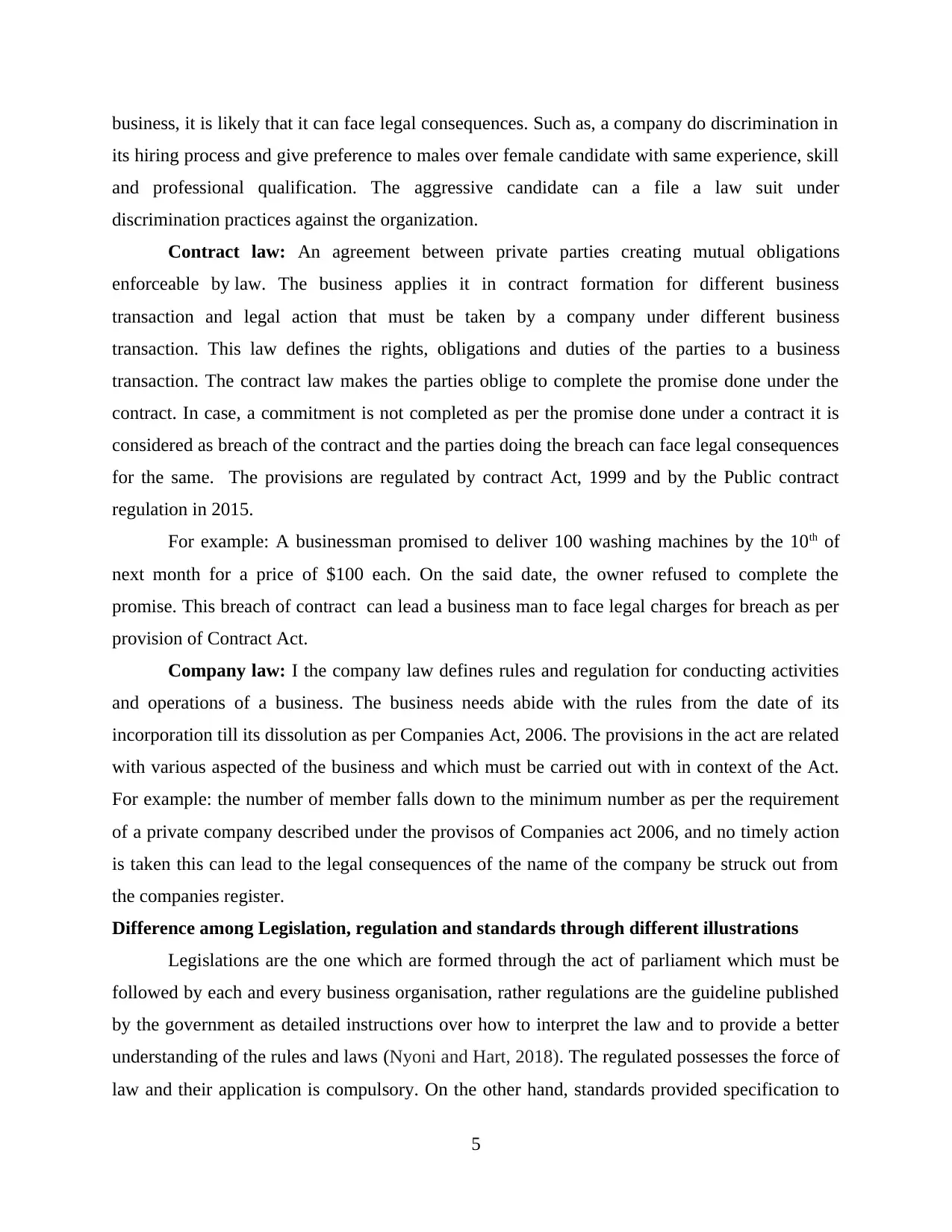
business, it is likely that it can face legal consequences. Such as, a company do discrimination in
its hiring process and give preference to males over female candidate with same experience, skill
and professional qualification. The aggressive candidate can a file a law suit under
discrimination practices against the organization.
Contract law: An agreement between private parties creating mutual obligations
enforceable by law. The business applies it in contract formation for different business
transaction and legal action that must be taken by a company under different business
transaction. This law defines the rights, obligations and duties of the parties to a business
transaction. The contract law makes the parties oblige to complete the promise done under the
contract. In case, a commitment is not completed as per the promise done under a contract it is
considered as breach of the contract and the parties doing the breach can face legal consequences
for the same. The provisions are regulated by contract Act, 1999 and by the Public contract
regulation in 2015.
For example: A businessman promised to deliver 100 washing machines by the 10th of
next month for a price of $100 each. On the said date, the owner refused to complete the
promise. This breach of contract can lead a business man to face legal charges for breach as per
provision of Contract Act.
Company law: I the company law defines rules and regulation for conducting activities
and operations of a business. The business needs abide with the rules from the date of its
incorporation till its dissolution as per Companies Act, 2006. The provisions in the act are related
with various aspected of the business and which must be carried out with in context of the Act.
For example: the number of member falls down to the minimum number as per the requirement
of a private company described under the provisos of Companies act 2006, and no timely action
is taken this can lead to the legal consequences of the name of the company be struck out from
the companies register.
Difference among Legislation, regulation and standards through different illustrations
Legislations are the one which are formed through the act of parliament which must be
followed by each and every business organisation, rather regulations are the guideline published
by the government as detailed instructions over how to interpret the law and to provide a better
understanding of the rules and laws (Nyoni and Hart, 2018). The regulated possesses the force of
law and their application is compulsory. On the other hand, standards provided specification to
5
its hiring process and give preference to males over female candidate with same experience, skill
and professional qualification. The aggressive candidate can a file a law suit under
discrimination practices against the organization.
Contract law: An agreement between private parties creating mutual obligations
enforceable by law. The business applies it in contract formation for different business
transaction and legal action that must be taken by a company under different business
transaction. This law defines the rights, obligations and duties of the parties to a business
transaction. The contract law makes the parties oblige to complete the promise done under the
contract. In case, a commitment is not completed as per the promise done under a contract it is
considered as breach of the contract and the parties doing the breach can face legal consequences
for the same. The provisions are regulated by contract Act, 1999 and by the Public contract
regulation in 2015.
For example: A businessman promised to deliver 100 washing machines by the 10th of
next month for a price of $100 each. On the said date, the owner refused to complete the
promise. This breach of contract can lead a business man to face legal charges for breach as per
provision of Contract Act.
Company law: I the company law defines rules and regulation for conducting activities
and operations of a business. The business needs abide with the rules from the date of its
incorporation till its dissolution as per Companies Act, 2006. The provisions in the act are related
with various aspected of the business and which must be carried out with in context of the Act.
For example: the number of member falls down to the minimum number as per the requirement
of a private company described under the provisos of Companies act 2006, and no timely action
is taken this can lead to the legal consequences of the name of the company be struck out from
the companies register.
Difference among Legislation, regulation and standards through different illustrations
Legislations are the one which are formed through the act of parliament which must be
followed by each and every business organisation, rather regulations are the guideline published
by the government as detailed instructions over how to interpret the law and to provide a better
understanding of the rules and laws (Nyoni and Hart, 2018). The regulated possesses the force of
law and their application is compulsory. On the other hand, standards provided specification to
5
Paraphrase This Document
Need a fresh take? Get an instant paraphrase of this document with our AI Paraphraser
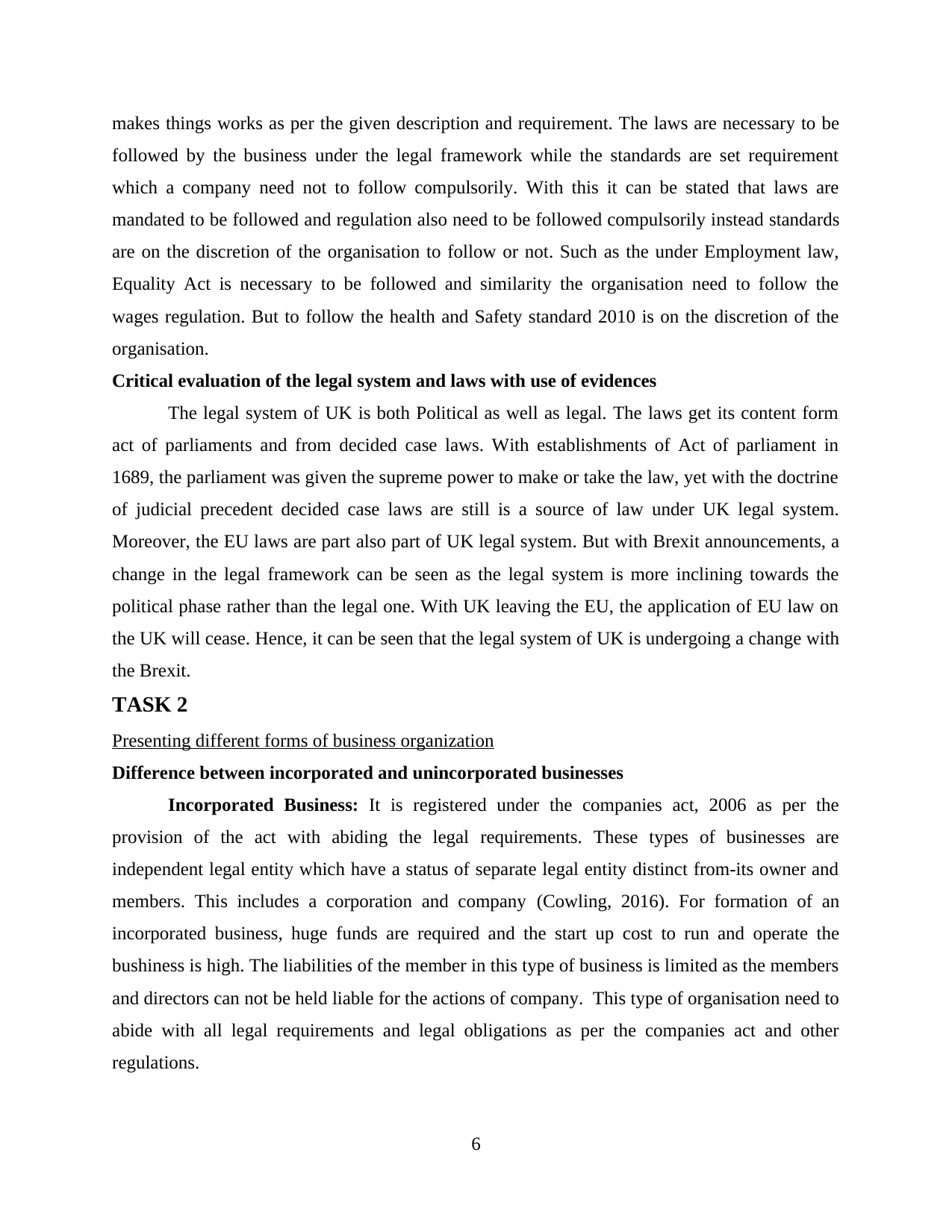
makes things works as per the given description and requirement. The laws are necessary to be
followed by the business under the legal framework while the standards are set requirement
which a company need not to follow compulsorily. With this it can be stated that laws are
mandated to be followed and regulation also need to be followed compulsorily instead standards
are on the discretion of the organisation to follow or not. Such as the under Employment law,
Equality Act is necessary to be followed and similarity the organisation need to follow the
wages regulation. But to follow the health and Safety standard 2010 is on the discretion of the
organisation.
Critical evaluation of the legal system and laws with use of evidences
The legal system of UK is both Political as well as legal. The laws get its content form
act of parliaments and from decided case laws. With establishments of Act of parliament in
1689, the parliament was given the supreme power to make or take the law, yet with the doctrine
of judicial precedent decided case laws are still is a source of law under UK legal system.
Moreover, the EU laws are part also part of UK legal system. But with Brexit announcements, a
change in the legal framework can be seen as the legal system is more inclining towards the
political phase rather than the legal one. With UK leaving the EU, the application of EU law on
the UK will cease. Hence, it can be seen that the legal system of UK is undergoing a change with
the Brexit.
TASK 2
Presenting different forms of business organization
Difference between incorporated and unincorporated businesses
Incorporated Business: It is registered under the companies act, 2006 as per the
provision of the act with abiding the legal requirements. These types of businesses are
independent legal entity which have a status of separate legal entity distinct from-its owner and
members. This includes a corporation and company (Cowling, 2016). For formation of an
incorporated business, huge funds are required and the start up cost to run and operate the
bushiness is high. The liabilities of the member in this type of business is limited as the members
and directors can not be held liable for the actions of company. This type of organisation need to
abide with all legal requirements and legal obligations as per the companies act and other
regulations.
6
followed by the business under the legal framework while the standards are set requirement
which a company need not to follow compulsorily. With this it can be stated that laws are
mandated to be followed and regulation also need to be followed compulsorily instead standards
are on the discretion of the organisation to follow or not. Such as the under Employment law,
Equality Act is necessary to be followed and similarity the organisation need to follow the
wages regulation. But to follow the health and Safety standard 2010 is on the discretion of the
organisation.
Critical evaluation of the legal system and laws with use of evidences
The legal system of UK is both Political as well as legal. The laws get its content form
act of parliaments and from decided case laws. With establishments of Act of parliament in
1689, the parliament was given the supreme power to make or take the law, yet with the doctrine
of judicial precedent decided case laws are still is a source of law under UK legal system.
Moreover, the EU laws are part also part of UK legal system. But with Brexit announcements, a
change in the legal framework can be seen as the legal system is more inclining towards the
political phase rather than the legal one. With UK leaving the EU, the application of EU law on
the UK will cease. Hence, it can be seen that the legal system of UK is undergoing a change with
the Brexit.
TASK 2
Presenting different forms of business organization
Difference between incorporated and unincorporated businesses
Incorporated Business: It is registered under the companies act, 2006 as per the
provision of the act with abiding the legal requirements. These types of businesses are
independent legal entity which have a status of separate legal entity distinct from-its owner and
members. This includes a corporation and company (Cowling, 2016). For formation of an
incorporated business, huge funds are required and the start up cost to run and operate the
bushiness is high. The liabilities of the member in this type of business is limited as the members
and directors can not be held liable for the actions of company. This type of organisation need to
abide with all legal requirements and legal obligations as per the companies act and other
regulations.
6
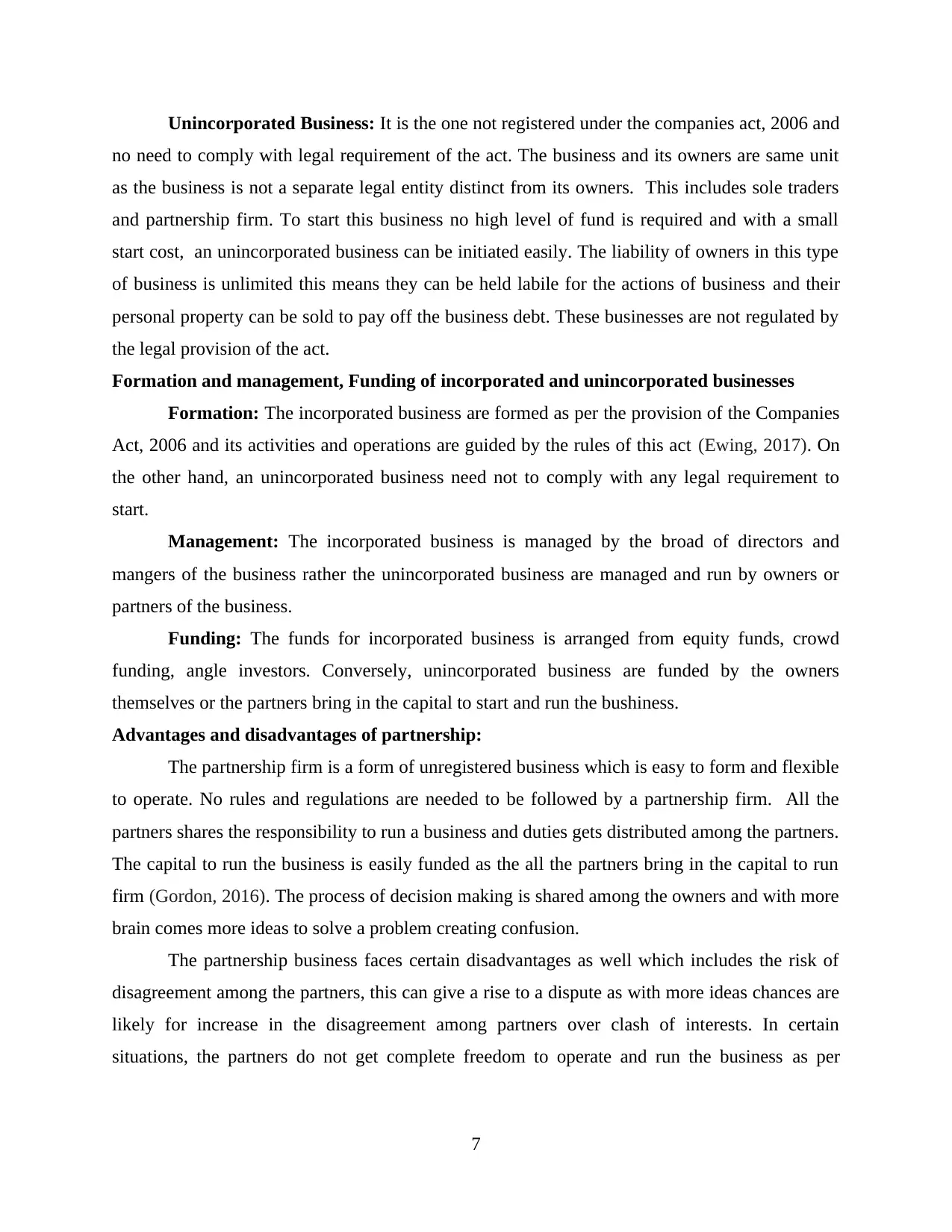
Unincorporated Business: It is the one not registered under the companies act, 2006 and
no need to comply with legal requirement of the act. The business and its owners are same unit
as the business is not a separate legal entity distinct from its owners. This includes sole traders
and partnership firm. To start this business no high level of fund is required and with a small
start cost, an unincorporated business can be initiated easily. The liability of owners in this type
of business is unlimited this means they can be held labile for the actions of business and their
personal property can be sold to pay off the business debt. These businesses are not regulated by
the legal provision of the act.
Formation and management, Funding of incorporated and unincorporated businesses
Formation: The incorporated business are formed as per the provision of the Companies
Act, 2006 and its activities and operations are guided by the rules of this act (Ewing, 2017). On
the other hand, an unincorporated business need not to comply with any legal requirement to
start.
Management: The incorporated business is managed by the broad of directors and
mangers of the business rather the unincorporated business are managed and run by owners or
partners of the business.
Funding: The funds for incorporated business is arranged from equity funds, crowd
funding, angle investors. Conversely, unincorporated business are funded by the owners
themselves or the partners bring in the capital to start and run the bushiness.
Advantages and disadvantages of partnership:
The partnership firm is a form of unregistered business which is easy to form and flexible
to operate. No rules and regulations are needed to be followed by a partnership firm. All the
partners shares the responsibility to run a business and duties gets distributed among the partners.
The capital to run the business is easily funded as the all the partners bring in the capital to run
firm (Gordon, 2016). The process of decision making is shared among the owners and with more
brain comes more ideas to solve a problem creating confusion.
The partnership business faces certain disadvantages as well which includes the risk of
disagreement among the partners, this can give a rise to a dispute as with more ideas chances are
likely for increase in the disagreement among partners over clash of interests. In certain
situations, the partners do not get complete freedom to operate and run the business as per
7
no need to comply with legal requirement of the act. The business and its owners are same unit
as the business is not a separate legal entity distinct from its owners. This includes sole traders
and partnership firm. To start this business no high level of fund is required and with a small
start cost, an unincorporated business can be initiated easily. The liability of owners in this type
of business is unlimited this means they can be held labile for the actions of business and their
personal property can be sold to pay off the business debt. These businesses are not regulated by
the legal provision of the act.
Formation and management, Funding of incorporated and unincorporated businesses
Formation: The incorporated business are formed as per the provision of the Companies
Act, 2006 and its activities and operations are guided by the rules of this act (Ewing, 2017). On
the other hand, an unincorporated business need not to comply with any legal requirement to
start.
Management: The incorporated business is managed by the broad of directors and
mangers of the business rather the unincorporated business are managed and run by owners or
partners of the business.
Funding: The funds for incorporated business is arranged from equity funds, crowd
funding, angle investors. Conversely, unincorporated business are funded by the owners
themselves or the partners bring in the capital to start and run the bushiness.
Advantages and disadvantages of partnership:
The partnership firm is a form of unregistered business which is easy to form and flexible
to operate. No rules and regulations are needed to be followed by a partnership firm. All the
partners shares the responsibility to run a business and duties gets distributed among the partners.
The capital to run the business is easily funded as the all the partners bring in the capital to run
firm (Gordon, 2016). The process of decision making is shared among the owners and with more
brain comes more ideas to solve a problem creating confusion.
The partnership business faces certain disadvantages as well which includes the risk of
disagreement among the partners, this can give a rise to a dispute as with more ideas chances are
likely for increase in the disagreement among partners over clash of interests. In certain
situations, the partners do not get complete freedom to operate and run the business as per
7
⊘ This is a preview!⊘
Do you want full access?
Subscribe today to unlock all pages.

Trusted by 1+ million students worldwide
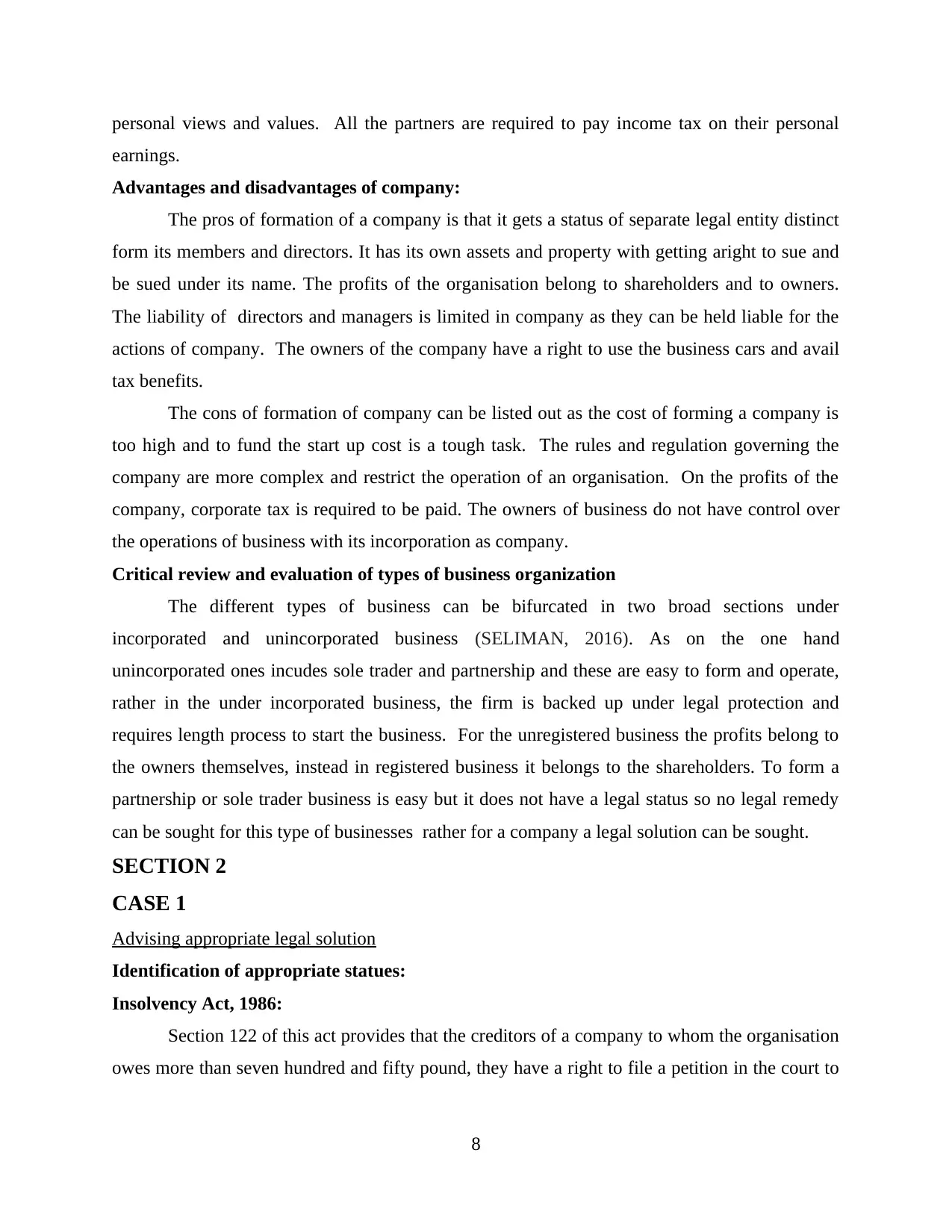
personal views and values. All the partners are required to pay income tax on their personal
earnings.
Advantages and disadvantages of company:
The pros of formation of a company is that it gets a status of separate legal entity distinct
form its members and directors. It has its own assets and property with getting aright to sue and
be sued under its name. The profits of the organisation belong to shareholders and to owners.
The liability of directors and managers is limited in company as they can be held liable for the
actions of company. The owners of the company have a right to use the business cars and avail
tax benefits.
The cons of formation of company can be listed out as the cost of forming a company is
too high and to fund the start up cost is a tough task. The rules and regulation governing the
company are more complex and restrict the operation of an organisation. On the profits of the
company, corporate tax is required to be paid. The owners of business do not have control over
the operations of business with its incorporation as company.
Critical review and evaluation of types of business organization
The different types of business can be bifurcated in two broad sections under
incorporated and unincorporated business (SELIMAN, 2016). As on the one hand
unincorporated ones incudes sole trader and partnership and these are easy to form and operate,
rather in the under incorporated business, the firm is backed up under legal protection and
requires length process to start the business. For the unregistered business the profits belong to
the owners themselves, instead in registered business it belongs to the shareholders. To form a
partnership or sole trader business is easy but it does not have a legal status so no legal remedy
can be sought for this type of businesses rather for a company a legal solution can be sought.
SECTION 2
CASE 1
Advising appropriate legal solution
Identification of appropriate statues:
Insolvency Act, 1986:
Section 122 of this act provides that the creditors of a company to whom the organisation
owes more than seven hundred and fifty pound, they have a right to file a petition in the court to
8
earnings.
Advantages and disadvantages of company:
The pros of formation of a company is that it gets a status of separate legal entity distinct
form its members and directors. It has its own assets and property with getting aright to sue and
be sued under its name. The profits of the organisation belong to shareholders and to owners.
The liability of directors and managers is limited in company as they can be held liable for the
actions of company. The owners of the company have a right to use the business cars and avail
tax benefits.
The cons of formation of company can be listed out as the cost of forming a company is
too high and to fund the start up cost is a tough task. The rules and regulation governing the
company are more complex and restrict the operation of an organisation. On the profits of the
company, corporate tax is required to be paid. The owners of business do not have control over
the operations of business with its incorporation as company.
Critical review and evaluation of types of business organization
The different types of business can be bifurcated in two broad sections under
incorporated and unincorporated business (SELIMAN, 2016). As on the one hand
unincorporated ones incudes sole trader and partnership and these are easy to form and operate,
rather in the under incorporated business, the firm is backed up under legal protection and
requires length process to start the business. For the unregistered business the profits belong to
the owners themselves, instead in registered business it belongs to the shareholders. To form a
partnership or sole trader business is easy but it does not have a legal status so no legal remedy
can be sought for this type of businesses rather for a company a legal solution can be sought.
SECTION 2
CASE 1
Advising appropriate legal solution
Identification of appropriate statues:
Insolvency Act, 1986:
Section 122 of this act provides that the creditors of a company to whom the organisation
owes more than seven hundred and fifty pound, they have a right to file a petition in the court to
8
Paraphrase This Document
Need a fresh take? Get an instant paraphrase of this document with our AI Paraphraser
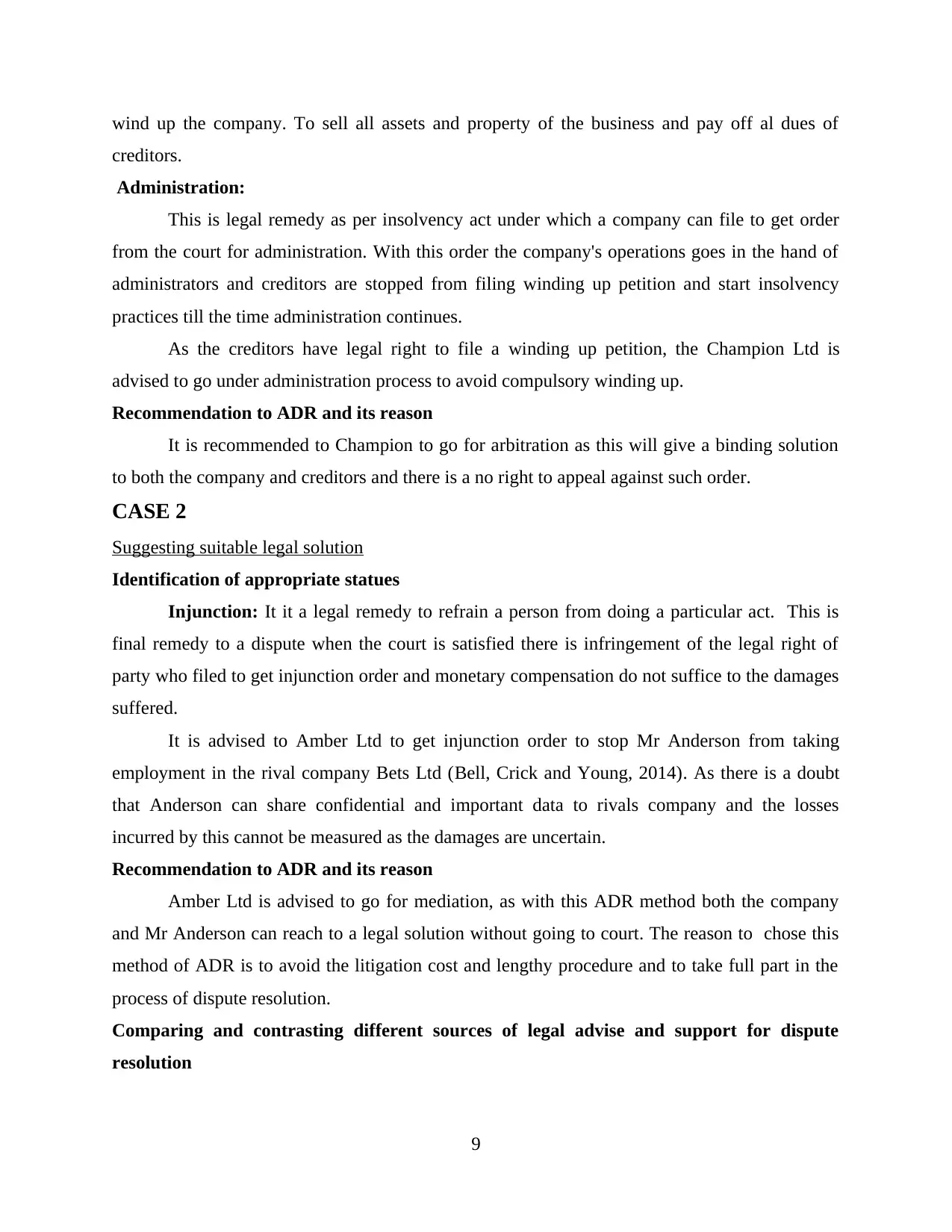
wind up the company. To sell all assets and property of the business and pay off al dues of
creditors.
Administration:
This is legal remedy as per insolvency act under which a company can file to get order
from the court for administration. With this order the company's operations goes in the hand of
administrators and creditors are stopped from filing winding up petition and start insolvency
practices till the time administration continues.
As the creditors have legal right to file a winding up petition, the Champion Ltd is
advised to go under administration process to avoid compulsory winding up.
Recommendation to ADR and its reason
It is recommended to Champion to go for arbitration as this will give a binding solution
to both the company and creditors and there is a no right to appeal against such order.
CASE 2
Suggesting suitable legal solution
Identification of appropriate statues
Injunction: It it a legal remedy to refrain a person from doing a particular act. This is
final remedy to a dispute when the court is satisfied there is infringement of the legal right of
party who filed to get injunction order and monetary compensation do not suffice to the damages
suffered.
It is advised to Amber Ltd to get injunction order to stop Mr Anderson from taking
employment in the rival company Bets Ltd (Bell, Crick and Young, 2014). As there is a doubt
that Anderson can share confidential and important data to rivals company and the losses
incurred by this cannot be measured as the damages are uncertain.
Recommendation to ADR and its reason
Amber Ltd is advised to go for mediation, as with this ADR method both the company
and Mr Anderson can reach to a legal solution without going to court. The reason to chose this
method of ADR is to avoid the litigation cost and lengthy procedure and to take full part in the
process of dispute resolution.
Comparing and contrasting different sources of legal advise and support for dispute
resolution
9
creditors.
Administration:
This is legal remedy as per insolvency act under which a company can file to get order
from the court for administration. With this order the company's operations goes in the hand of
administrators and creditors are stopped from filing winding up petition and start insolvency
practices till the time administration continues.
As the creditors have legal right to file a winding up petition, the Champion Ltd is
advised to go under administration process to avoid compulsory winding up.
Recommendation to ADR and its reason
It is recommended to Champion to go for arbitration as this will give a binding solution
to both the company and creditors and there is a no right to appeal against such order.
CASE 2
Suggesting suitable legal solution
Identification of appropriate statues
Injunction: It it a legal remedy to refrain a person from doing a particular act. This is
final remedy to a dispute when the court is satisfied there is infringement of the legal right of
party who filed to get injunction order and monetary compensation do not suffice to the damages
suffered.
It is advised to Amber Ltd to get injunction order to stop Mr Anderson from taking
employment in the rival company Bets Ltd (Bell, Crick and Young, 2014). As there is a doubt
that Anderson can share confidential and important data to rivals company and the losses
incurred by this cannot be measured as the damages are uncertain.
Recommendation to ADR and its reason
Amber Ltd is advised to go for mediation, as with this ADR method both the company
and Mr Anderson can reach to a legal solution without going to court. The reason to chose this
method of ADR is to avoid the litigation cost and lengthy procedure and to take full part in the
process of dispute resolution.
Comparing and contrasting different sources of legal advise and support for dispute
resolution
9
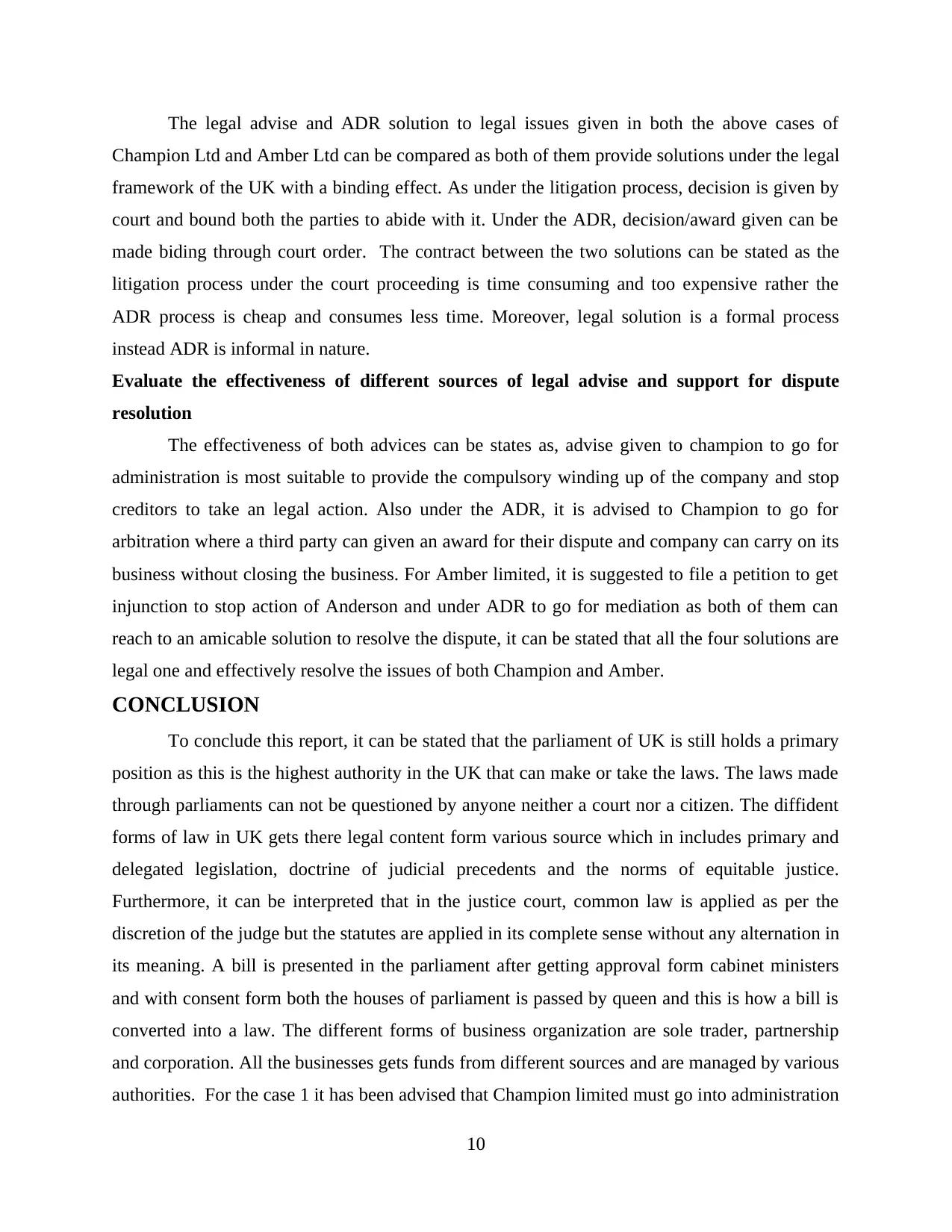
The legal advise and ADR solution to legal issues given in both the above cases of
Champion Ltd and Amber Ltd can be compared as both of them provide solutions under the legal
framework of the UK with a binding effect. As under the litigation process, decision is given by
court and bound both the parties to abide with it. Under the ADR, decision/award given can be
made biding through court order. The contract between the two solutions can be stated as the
litigation process under the court proceeding is time consuming and too expensive rather the
ADR process is cheap and consumes less time. Moreover, legal solution is a formal process
instead ADR is informal in nature.
Evaluate the effectiveness of different sources of legal advise and support for dispute
resolution
The effectiveness of both advices can be states as, advise given to champion to go for
administration is most suitable to provide the compulsory winding up of the company and stop
creditors to take an legal action. Also under the ADR, it is advised to Champion to go for
arbitration where a third party can given an award for their dispute and company can carry on its
business without closing the business. For Amber limited, it is suggested to file a petition to get
injunction to stop action of Anderson and under ADR to go for mediation as both of them can
reach to an amicable solution to resolve the dispute, it can be stated that all the four solutions are
legal one and effectively resolve the issues of both Champion and Amber.
CONCLUSION
To conclude this report, it can be stated that the parliament of UK is still holds a primary
position as this is the highest authority in the UK that can make or take the laws. The laws made
through parliaments can not be questioned by anyone neither a court nor a citizen. The diffident
forms of law in UK gets there legal content form various source which in includes primary and
delegated legislation, doctrine of judicial precedents and the norms of equitable justice.
Furthermore, it can be interpreted that in the justice court, common law is applied as per the
discretion of the judge but the statutes are applied in its complete sense without any alternation in
its meaning. A bill is presented in the parliament after getting approval form cabinet ministers
and with consent form both the houses of parliament is passed by queen and this is how a bill is
converted into a law. The different forms of business organization are sole trader, partnership
and corporation. All the businesses gets funds from different sources and are managed by various
authorities. For the case 1 it has been advised that Champion limited must go into administration
10
Champion Ltd and Amber Ltd can be compared as both of them provide solutions under the legal
framework of the UK with a binding effect. As under the litigation process, decision is given by
court and bound both the parties to abide with it. Under the ADR, decision/award given can be
made biding through court order. The contract between the two solutions can be stated as the
litigation process under the court proceeding is time consuming and too expensive rather the
ADR process is cheap and consumes less time. Moreover, legal solution is a formal process
instead ADR is informal in nature.
Evaluate the effectiveness of different sources of legal advise and support for dispute
resolution
The effectiveness of both advices can be states as, advise given to champion to go for
administration is most suitable to provide the compulsory winding up of the company and stop
creditors to take an legal action. Also under the ADR, it is advised to Champion to go for
arbitration where a third party can given an award for their dispute and company can carry on its
business without closing the business. For Amber limited, it is suggested to file a petition to get
injunction to stop action of Anderson and under ADR to go for mediation as both of them can
reach to an amicable solution to resolve the dispute, it can be stated that all the four solutions are
legal one and effectively resolve the issues of both Champion and Amber.
CONCLUSION
To conclude this report, it can be stated that the parliament of UK is still holds a primary
position as this is the highest authority in the UK that can make or take the laws. The laws made
through parliaments can not be questioned by anyone neither a court nor a citizen. The diffident
forms of law in UK gets there legal content form various source which in includes primary and
delegated legislation, doctrine of judicial precedents and the norms of equitable justice.
Furthermore, it can be interpreted that in the justice court, common law is applied as per the
discretion of the judge but the statutes are applied in its complete sense without any alternation in
its meaning. A bill is presented in the parliament after getting approval form cabinet ministers
and with consent form both the houses of parliament is passed by queen and this is how a bill is
converted into a law. The different forms of business organization are sole trader, partnership
and corporation. All the businesses gets funds from different sources and are managed by various
authorities. For the case 1 it has been advised that Champion limited must go into administration
10
⊘ This is a preview!⊘
Do you want full access?
Subscribe today to unlock all pages.

Trusted by 1+ million students worldwide
1 out of 14
Related Documents
Your All-in-One AI-Powered Toolkit for Academic Success.
+13062052269
info@desklib.com
Available 24*7 on WhatsApp / Email
![[object Object]](/_next/static/media/star-bottom.7253800d.svg)
Unlock your academic potential
Copyright © 2020–2026 A2Z Services. All Rights Reserved. Developed and managed by ZUCOL.



